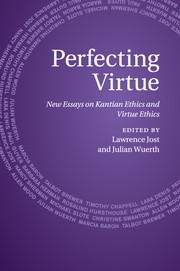Book contents
- Frontmatter
- Contents
- Notes on contributors
- Acknowledgements
- List of abbreviations
- Introduction
- 1 Virtue ethics in relation to Kantian ethics: an opinionated overview and commentary
- 2 What does the Aristotelian phronimos know?
- 3 Kant and agent-oriented ethics
- 4 The difference that ends make
- 5 Two pictures of practical thinking
- 6 Moving beyond Kant's account of agency in the Grounding
- 7 A Kantian conception of human flourishing
- 8 Kantian perfectionism
- 9 Aristotle, the Stoics, and Kant on anger
- 10 Kant's impartial virtues of love
- 11 The problem we all have with deontology
- 12 Intuition, system, and the “paradox” of deontology
- Bibliography
- Index
3 - Kant and agent-oriented ethics
Published online by Cambridge University Press: 04 February 2011
- Frontmatter
- Contents
- Notes on contributors
- Acknowledgements
- List of abbreviations
- Introduction
- 1 Virtue ethics in relation to Kantian ethics: an opinionated overview and commentary
- 2 What does the Aristotelian phronimos know?
- 3 Kant and agent-oriented ethics
- 4 The difference that ends make
- 5 Two pictures of practical thinking
- 6 Moving beyond Kant's account of agency in the Grounding
- 7 A Kantian conception of human flourishing
- 8 Kantian perfectionism
- 9 Aristotle, the Stoics, and Kant on anger
- 10 Kant's impartial virtues of love
- 11 The problem we all have with deontology
- 12 Intuition, system, and the “paradox” of deontology
- Bibliography
- Index
Summary
It is often observed that “virtue ethics” is difficult to discuss because it consists less in an ethical theory in its own right than in a loose grab-bag of criticisms and complaints against other ethical theories (or even ethical theory as such). To some extent, however, this is no longer true now that some representatives of virtue ethics, such as Michael Slote and Rosalind Hursthouse, have begun to offer virtue ethics as a distinctive kind of ethical theory in its own right. The main thrust of these theories is to make judgments about agents (about their virtues and vices, often based on their motives) central or fundamental to ethical theory. This contrasts with theories that focus on judgments about the rightness or wrongness of actions (as deontic theories are supposed to do) or the goodness or badness of consequences (as with consequentialist theories).
In this taxonomy (so simplistic that we should know already that it is bound to do more harm than good), Kant is conventionally regarded as a “deontic” ethical theorist. But it would require a considerable effort of will (and a rather malicious will at that) to see him as placing the rightness of actions at the center of theoretical attention. Nevertheless, this distortion often occurs in Anglophone philosophy because Kant tends to be lumped together with the rationalist-intuitionist school in British ethics, which is where people get their idea of what a deontological ethical theory must be like.
- Type
- Chapter
- Information
- Perfecting VirtueNew Essays on Kantian Ethics and Virtue Ethics, pp. 58 - 91Publisher: Cambridge University PressPrint publication year: 2011
- 3
- Cited by

